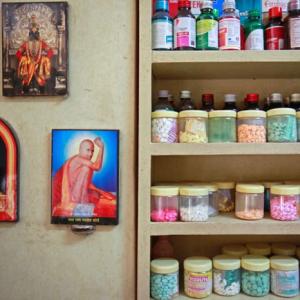There are two pharmaceutical industries in India -The first sells its produce in large volumes in quality-conscious United States, the gold standard, while the second sells chalta hai medicine within the country without fear, notes Bhupesh Bhandari.

Dinesh Thakur, the Ranbaxy whistleblower, seems to be waging a lone battle against sub-standard medicine.
After the Supreme Court threw out his plea that sought "the creation of a framework for the recall of drugs and a commission to examine faulty drug approvals", Thakur has been diligently uploading information he has collated over the years on his website. It is an eye opener.
There are, in effect, two pharmaceutical industries in India that work in parallel: one compares with the best in the world and the second with the worst.
The first sells its produce in large volumes in quality-conscious United States, the gold standard, while the second sells chalta hai medicine within the country without fear.
To put it differently, the Indian pharmaceutical sector, which makes the finest medicine in the world, sells sub-standard stuff to Indians.
This is because Indian regulation is lax. On their part, pharmaceutical companies argue, with a lot of justification, that India has become an impossible place to work in, thanks to the ever-expanding price controls, which leaves them with no money to upgrade their processes and machines.
Thakur, through his research, has brought valuable new insights into the debate.
The bigger players often blame the smaller ones - the long tail of pharmaceutical companies - for the mess.
The smaller companies, the argument goes, cannot have production units of a high standard and they resist all demand for stricter regulation because it will put them out of business.
Thakur's work shows that this is not the complete picture: the big companies too are responsible for the sub-standard drugs in the market.
To prove this, he has painstakingly accessed several blacklists complied from time to time - these contain many big names of the pharmaceutical world as well as a host of public sector units.
Thakur has included the lists of the Medical Stores Organisation that does all the public procurement for the Union ministry of health, various states and railways.
Moreover, Thakur adds it is common for large companies to outsource production to smaller units, which really blurs the distinction between the two sets of players.
"The industry's propaganda machine is very effective; it has created a false narrative that the small and medium companies are the root of the problem," Thakur blogged on April 28.
There is more dirt that Thakur has unearthed.
Under the rules, it is the state which can suspend the production licence of a company if it is found to make sub-standard drugs.
This means that there is little that Karnataka can do about an errant producer located in Himachal Pradesh except request that state to take action.
Besides, says Thakur, there is no consistency amongst different states in the manner in which licences of erring manufacturers are suspended.
"For example, while states like Himachal Pradesh suspend licences for 15 days to three months, states like Uttarakhand would suspend licences for a mere 20 days and Gujarat for just one day," he wrote on April 24.
That's not all. Thakur questions the enforcement of these suspensions.
Even in states where frequent suspensions were handed out, Thakur says he did not come across a single case where the action was challenged in a court of low.
Clearly, the suspension was either too insignificant or only on paper. The wrongdoers have been going scot-free.
It gets more interesting from here.
Indian companies, says Thakur, regularly do drug recalls in the United States and the European Union but never in India.
"The key reason why we do not see such action in India is because the Indian drug regulatory law does not have a legal framework mandating such recalls," he wrote on April 18.
"There is no legal requirement under the law for the manufacturer to initiate a nation-wide recall and there is no procedure to monitor such recalls."
This is serious.
The Central Drug Standards Control Organisation has created the "drug alert system" to address this problem but Thakur argues that it won't be of much use unless it is integrated with the states' labs which do most of the testing on medicine.
"The enactment of a mandatory recall mechanism would have been a game changer in the Indian context because the number of alerts generated by each state would have forced a wider debate on the reason behind such recalls," Thakur wrote.
Thakur's arguments are logical and forceful. They are also a little inconvenient for the pharmaceutical industry.
So it didn't come as a surprise that when Thakur launched his campaign, many raised doubts over his intentions.
Some went to the extent of calling the whole thing another Big Pharma ploy to discredit Indian producers of inexpensive generic medicine.
Whatever be his motive, everybody must listen to Thakur if the Augean Stables have to be cleared.
His plea may have been rejected but there is substance in what he says.










